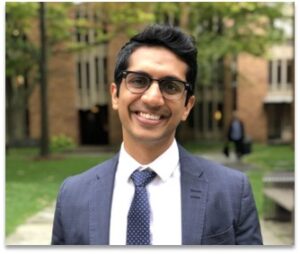DLSPH Graduate Awards in Data Science for Public Health and Health Systems
Meet the 2022-2023 Recipients
Joseph Donia
Project Title: Critical questions for data-intensive health innovation: A design ethics case study
Supervisor(s): Dr. Jay Shaw & Dr. Jennifer Gibson
Joseph is a second-year PhD student at the Institute of Health Policy, Management & Evaluation where his research focuses on the ethics and politics of data, digital health, and design. He is currently pursuing these lines of inquiry through two projects: an ethics and policy analysis of a machine learning-enabled smart physiotherapy monitoring system, and an institutional ethnography of three health-related AI development settings. Fundamentally, his work seeks to advance both theoretical and practical insights aimed at ensuring that data and data-intensive technologies contribute to better health and health care systems for all.
In 2021-22 Joseph held the Benita M. Warmbold Fellowship in Health System Innovation at Women’s College Hospital, and a Graduate Fellowship in Ethics of AI at the University of Toronto’s Centre for Ethics. In 2018 he was also chosen as an inaugural scholar in AI Ethics and Health by the University of Toronto’s Joint Centre for Bioethics. His doctoral dissertation is supported by a Social Sciences and Humanities Research Council Doctoral Fellowship.

Jo-Ann Osei-Twum
Project Title: Comparing data science approaches to population health management and the associated health equity implications
Supervisor(s): Dr. Laura Rosella
Jo-Ann Osei-Twum is a PhD student in Epidemiology at the Dalla Lana School of Public Health (DLSPH), University of Toronto, completing an emphasis in Artificial intelligence and Data Science. Her research interests include population health interventions, social epidemiology, emerging technologies, and the implications for the health, wellbeing, and livability of Black and Indigenous peoples. Her work focuses on applying critical data science methods to population health management, using administrative health data. Prior to starting her PhD, Jo-Ann completed a MSc in Pharmaceutical Sciences at the University of British Columbia and an MPH in Social and Behavioural Health Sciences at DLSPH. Jo-Ann has a breadth of professional experience having previously worked in academic, government, health care, and non-profit settings in Canada and southern Africa.

Rose Garrett
Project Title: The role of sensitivity analysis in handling untestable assumptions in analyses of electronic health record data: an example in pediatric healthcare
Supervisor(s): Dr. Eleanor Pullenayegum (in collaboration with Dr. Brian Feldman)
Rose is a PhD candidate in Biostatistics at the Dalla Lana School of Public Health at the University of Toronto, working under the supervision of Dr. Eleanor Pullenayegum. Rose’s dissertation focusses on Bayesian approaches for analyzing data collected from electronic health records over time. Her thesis is a collaborative project with Dr. Brian Feldman at the Division of Rheumatology at the Hospital for Sick Children, and Rose’s work developing novel statistical methodology is motivated by clinical research questions about the disease trajectory of juvenile dermatomyositis. Rose holds an HBSc in Statistics and Ecology & Evolutionary Biology, and an MSc in Biostatistics, both from the University of Toronto.

Vinyas Harish
Project Title: Assessing the stability of machine learning models to dataset shift during the COVID-19 pandemic
Supervisor(s): Dr. Laura Rosella & Dr. Kamran Khan
Vinyas Harish is a fifth year MD/PhD Candidate at the Temerty Faculty of Medicine and Dalla Lana School of Public Health at the University of Toronto. He is also a Postgraduate Affiliate at the Vector Institute and a Graduate Fellow at the Schwartz Reisman Institute for Technology and Society. He holds a CIHR Frederick Banting and Charles Best Canada Graduate Scholarship (Doctoral) Award to investigate how digital technology can support public health emergency response and promote resilient health systems. His research areas include machine learning, emergency preparedness, clinical and population decision support systems, and the governance of artificial intelligence in health. His clinical interest is in emergency medicine.
